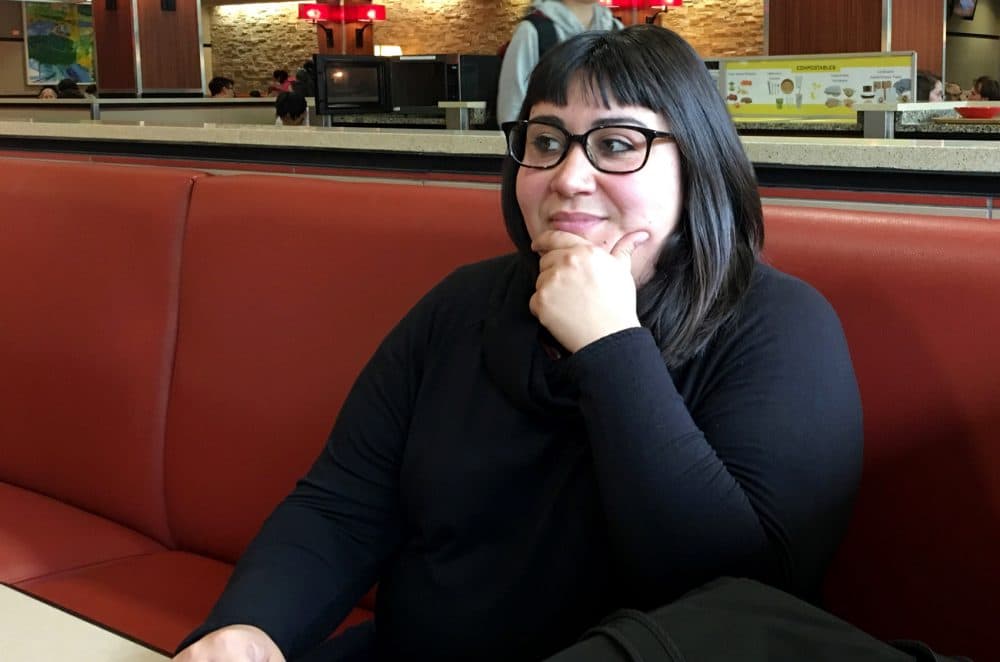Advertisement
Program To Reward Public Service With Student Debt Forgiveness Collides With The Trump Budget
ResumeIt's just a proposal so far. But one portion of the federal budget offered by President Donald Trump this week has some Massachusetts college students worried about careers they may pursue.
The Trump administration says it wants to simplify the federal college loan program with a single repayment system that's based on how much someone makes.
But it would end some federal practices of supporting student borrowers, including a popular incentive for students who choose a career in public service — and, often enough, lower pay.
A Social Worker's Worries Around Student Debt
That's the course being followed by 29-year-old Griselda Tomaino, who was, until recently, a full-time social worker. She worked as an intensive care coordinator, helping families find wraparound therapy and support for kids struggling with mental illnesses, like "ADHD, adjustment disorder, PTSD [post-traumatic stress disorder], depression, anxiety."

That meant she had to juggle nine or 10 complicated cases on any given week. And since she speaks Spanish and Portuguese, she had extra cases and spent time translating.
For that work, she earned $37,000 a year — just about half the median household income in Massachusetts.
And she has a mountain of college debt. She borrowed about $60,000 to get her bachelor's degree at Boston University.
Now, she hopes to get licensed as a social worker — so she'll need a master's degree. Tomaino will pursue hers at Smith College starting in the fall. That means more loans, bringing her up to around $100,000 in total debt.
But she has cause for hope, in something called Public Service Loan Forgiveness (PSLF). It's a federal program that pays off the student debt of people after 10 years working in the public interest, in either government or for nonprofits.
For Tomaino, that would make a world of difference: "Me being able to buy a car, saving money up for a house, it would mean a lot."
Tomaino registered for the program last year, which means she has nine more years of work to go. But she says she wouldn't have chosen a different route, even if this program weren't available.
"This is the profession where my strengths lie, and where I truly feel intelligent and like I'm making an impact on the world — and I wouldn't trade that in," she said.
The Debate Over Trump's Proposal
Nationwide 550,000 students have signed up in anticipation of that same public service benefit. The first wave of participants expects to see their debt wiped out later this year.
But with his budget, Trump is proposing an end to PSLF, as well as to federal subsidies that cover loan interest while a student is still in school.
Instead, he would ask all undergraduates with federal loans to pay 12.5 percent of their income for the first 15 years after graduation. The rest would be forgiven. That's a slight rejiggering of the loan forgiveness program set up during the Obama administration.
The changes are supposed to simplify a labyrinthine loan system that's built up over decades.
Pauline Abernathy, executive vice president for policy at the Institute for College Access and Success, says simplicity is a worthy goal — but that Trump's proposal isn't the way to go about it.
"These changes together would dramatically increase borrowing costs — and there's no reason that simplification needs to do that," she said.
The institute estimates that ending federal subsidies could raise the price of borrowing by 15 to 25 percent — which could mean thousands of dollars more per student — and that a teacher who seeks a master's degree could pay three times as much as she does right now.
The Trump budget argues that, as it stands, loan forgiveness for graduates pursuing public service careers "unfairly favors some career choices over others."
Economist Jason Delisle supports the move with criticisms of his own. He says that cases like Tomaino's show the program has created a perverse incentive for schools to overcharge and for students to over-borrow on their way to an expensive graduate degree.
"The student can show up and say, 'I don't need to worry about how much this program costs. I'm not paying for it.' That's crazy! And we've let the school off the hook," he said.
Delisle is concerned about a coming billion-dollar "bonanza," when hundreds of thousands of students with lots of debt — including doctors and lawyers who work in nonprofit jobs — will pass the remainder on to taxpayers.
But Abernathy says that doesn't quite touch the point of the public service plan — which was to use federal support to induce students into jobs they might not otherwise take for fear of low pay and falling behind on debt.
"Particularly in rural areas and in certain communities where there's a shortage of professionals, the public service loan forgiveness is really essential for helping to attract people to those professions," she explained.
"This is the profession, where my strengths lie, and where I truly feel intelligent and like I'm making an impact on the world — and I wouldn't trade that in."
Griselda Tomaino
For her part, Tomaino, the former social worker, is watching the policy discussion with some concern. But she doesn't have to worry — at least about her undergraduate debt. Officials at the Department of Education said this week that loans borrowed before summer 2018 would be grandfathered into the forgiveness plan.
How will she get by if things do change while she's studying for her master's degree?
"I'm pretty resourceful," she said. "If I ever get to the point where I need to do any sort of combination of things to make it work, I'll just make it work."
For now, that means Tomaino has set up a GoFundMe page to ask for donations toward her tuition while she hopes for the best from Washington.
This segment aired on May 25, 2017.
